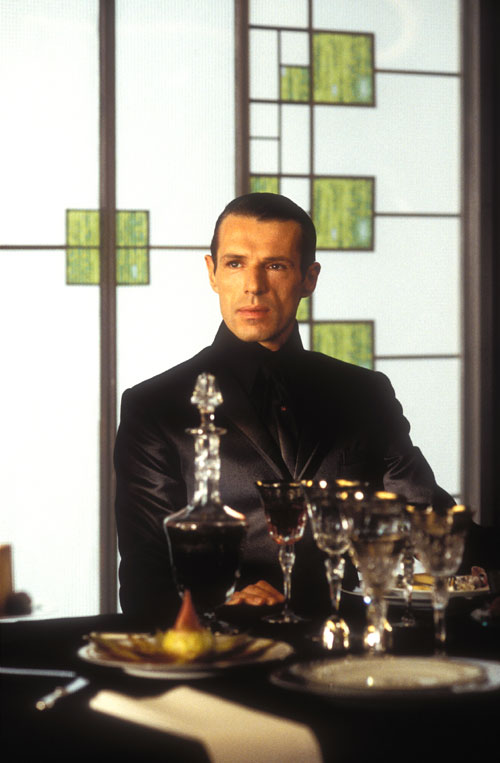
_The Matrix_ Trilogy

Background
After a prolonged war against rebellious machines, the human race was at last subjugated. Grown now instead of born, humans are produced in huge fields and plugged into generators that absorb their body heat and electrical impulses to power the machine world. In the meantime the human consciousness is uploaded into a computer program known as the Matrix, which resembles the peak of human civilization.
After the rebel leader Morpheus succeeds in liberating the mind of Neo, believed to be “The One” who will deliver humanity from mechanical rule, the heroes attempt to locate the Keymaker, who holds the power to unlock the gateway to the core of the Matrix. However, the Keymaker is in the custody of the Merovingian, an ancient program who surrounds himself in lavish palaces of sin. The heroes defeat the Merovingian's guards and rescue the Keymaker, but they must deal with the Merovingian again when Neo falls into the hands of the Trainman, a program on the Merovingian's payroll. By this point the Merovingian has defeated the Oracle, his rival, shattering her old shell and forcing her to regroup in a new form. He demands the eyes of the Oracle in return for Neo's release, but a brief gunfight later he is persuaded by a “point-blank” offer and releases the messiah.
Analysis
In the heavy religious themes that percolate throughout the Matrix series, the Merovingian is, if not Satan, then Beelzebub or some other incarnation of the devil. He is better suited to this role than Agent Smith, since Smith is far more active and deals directly with the world, like the antichrist. The Merovingian, on the other hand, remains in the shadows and controls a vast sphere of influence. He is surrounded by excess and appears to practice every deadly sin.
The Merovingian is obsessed with “causality”, and believes that absolutely everything happens for a reason. He likes to be that reason, and attempts to control as much as possible, even down to bodily functions stimulated by a spiked piece of cake. His infatuation with abstract causality has resulted in the estrangement of his wife, Persephone, who hungers for the emotional sensations her husband has become void of.
The Merovingian is named after a line of Frankish kings who ruled an area between France and Germany from the 5 th to the 8 th century AD. Merovingian kings wore their hair long, though the significance of that is unknown, and they gradually began to place all of their strongest powers in the hands of “major domos”, while they themselves became relegated to ceremonial roles. It is unclear, then, why the Merovingian from the Matrix movies is so-named. While he can be considered the king of the underworld, his hair is not long and he certainly seems to be the one in control of his empire, rather than one of his servants.